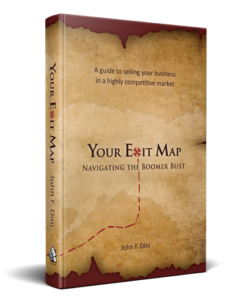 Your ExitMap Blog
Your ExitMap Blog
Exit Planning Articles Focused on Exit Strategies
Plan: Exit Strategies
What do you need to know to prepare well, and successfully implement a lucrative transfer of the business? What do the acquisition markets look like? How do current events impact your time frame or financial objectives?
What do you need to know to prepare well, and successfully implement a lucrative transfer of the business? What do the acquisition markets look like? How do current events impact your time frame or financial objectives?
Most Recent Your ExitMap Blog Articles
The Unplanned Exit One of the least-heralded benefits of exit planning is preparation for an unplanned exit. In the brokerage business, the reasons driving the listing of a company are known collectively as the Dismal D’s. Some of “Da D’s” are just typical reasons behind putting a business up for sale. They include Dissension among partners, Declining sales, Divorce, Disinterest by, or Distraction of the owner and Debt. Others are the driving force for an emergency sale, usually far below the fair market value. Those are Disaster, Disease, Disability and Death. As we’ve said many times before in this space, sooner or later every owner leaves his or ... Read more One of the least-heralded benefits of exit planning is preparation for an unplanned exit. In the brokerage business, the reasons driving the listing of a company are known collectively as the Dismal D’s. Some of “Da D’s” are just typical reasons behind putting a business up for sale. They include Dissension among partners, Declining sales, Divorce, Disinterest by, or Distraction of the owner and Debt. Others are the driving force for an emergency sale, usually far below the fair market value. Those are Disaster, Disease, Disability and Death. As we’ve said many times before in this space, sooner or later every owner leaves his or ... Read more Exit Planning: Controlling Your Choices Many owners are reluctant to plan for their departure from the business. In some cases it’s because they are too comfortable with ambiguity (see my previous post.) For others it is because they fear losing control. They believe that setting a final date for their departure, even tentatively, starts a process that will take on a life of its own. The tag line of this column is “Control the most important financial event of your life.” Control is the key. Refusing to deal with the realities of an eventual transition from the business is surrendering control. Sooner or later, something will happen that requires a transfer of the ... Read more Many owners are reluctant to plan for their departure from the business. In some cases it’s because they are too comfortable with ambiguity (see my previous post.) For others it is because they fear losing control. They believe that setting a final date for their departure, even tentatively, starts a process that will take on a life of its own. The tag line of this column is “Control the most important financial event of your life.” Control is the key. Refusing to deal with the realities of an eventual transition from the business is surrendering control. Sooner or later, something will happen that requires a transfer of the ... Read more Ambiguity Kills Value Ambiguity kills value. That was a key point in a white paper from Orange Kiwi that I read over the holidays. Taken from the PhD thesis of Dr. Allie Taylor, the paper describes the psychological profile of entrepreneurs, and their historical reluctance to begin an exit planning process. According to Dr. Taylor, entrepreneurs have five major behavioral traits; Risk Taking, Innovativeness, Need for Achievement, tolerance for Ambiguity and a locus for Control. This follows closely my description of the mind of an entrepreneur in Hunting in a Farmer’s World. In that book I discuss the traits of tenacious problem solving and the ability to navigate in the ... Read more Ambiguity kills value. That was a key point in a white paper from Orange Kiwi that I read over the holidays. Taken from the PhD thesis of Dr. Allie Taylor, the paper describes the psychological profile of entrepreneurs, and their historical reluctance to begin an exit planning process. According to Dr. Taylor, entrepreneurs have five major behavioral traits; Risk Taking, Innovativeness, Need for Achievement, tolerance for Ambiguity and a locus for Control. This follows closely my description of the mind of an entrepreneur in Hunting in a Farmer’s World. In that book I discuss the traits of tenacious problem solving and the ability to navigate in the ... Read more Four Basics of Exit Planning 4: Professional Team Your professional team is the fourth component of exit planning preparation. We’ve already discussed valuation, distance to goal and classes of buyers. Taken together, these basics aren’t enough by themselves to execute an exit plan, but understanding the first three and assembling the fourth will go a long way to ensuring that any plan you develop is practical and achievable. Many clients say “No problem. I already have a lawyer and an accountant.” But your professional team should be able to offer more than just technical advice. Any competent CPA can tell you what the difference is between ordinary income tax and capital gains. Far ... Read more Your professional team is the fourth component of exit planning preparation. We’ve already discussed valuation, distance to goal and classes of buyers. Taken together, these basics aren’t enough by themselves to execute an exit plan, but understanding the first three and assembling the fourth will go a long way to ensuring that any plan you develop is practical and achievable. Many clients say “No problem. I already have a lawyer and an accountant.” But your professional team should be able to offer more than just technical advice. Any competent CPA can tell you what the difference is between ordinary income tax and capital gains. Far ... Read more Four Basics of Exit Planning 3: Know Your Buyer Know your buyer? Your initial reaction to this title may be “How can I know my buyer? I haven’t even decided to sell yet!” Nonetheless, understanding the type of buyer that your company will attract is vital. More importantly, gaining that understanding long before you go to market will impact many decisions about how to run your business between now and when you start to actively market the company for sale. The classes of buyers are not interchangeable. I once worked with the owner of a subcontracting company. He told me “I want to find a strategic buyer. I know they pay higher multiples than anyone else.” That’s nice ... Read more Know your buyer? Your initial reaction to this title may be “How can I know my buyer? I haven’t even decided to sell yet!” Nonetheless, understanding the type of buyer that your company will attract is vital. More importantly, gaining that understanding long before you go to market will impact many decisions about how to run your business between now and when you start to actively market the company for sale. The classes of buyers are not interchangeable. I once worked with the owner of a subcontracting company. He told me “I want to find a strategic buyer. I know they pay higher multiples than anyone else.” That’s nice ... Read more Four Basics of Exit Planning 2: Distance to Goal Once you understand your company’s value, the next step in planning is to calculate your Distance to Goal. As the Cheshire Cat said, “If you don’t know where you are going, any road will get you there.” “Any road” is not the way you want to approach the biggest financial event of a career. Distance to Goal calculations require an understanding of where you are now, where you want to wind up, and how long you need to get there. In both industry surveys and my own experience, the majority of business owners have (at best,) only a rough idea of the road they will ... Read more Once you understand your company’s value, the next step in planning is to calculate your Distance to Goal. As the Cheshire Cat said, “If you don’t know where you are going, any road will get you there.” “Any road” is not the way you want to approach the biggest financial event of a career. Distance to Goal calculations require an understanding of where you are now, where you want to wind up, and how long you need to get there. In both industry surveys and my own experience, the majority of business owners have (at best,) only a rough idea of the road they will ... Read more Four Basics of Exit Planning 1: Valuation There are four basics an owner should address before beginning any exit, succession, or transition plan. They are Valuation, Distance to Goal, Prospective Buyers, and Professional Team. First, my apologies for missing a tri-weekly post. Between trips to Denver for BEI’s National Exit Planning Conference, Dallas for a client, San Antonio for our own XPX Exit Planning Summit, Nashville for the national EPI Exit Planning Summit, and St. Louis for Archford’s Metro Business Owner Summit, I kind of lost track of my posting schedule. Here is the first of the four basic requirements. I promise not to dally in posting the rest of the full ... Read more There are four basics an owner should address before beginning any exit, succession, or transition plan. They are Valuation, Distance to Goal, Prospective Buyers, and Professional Team. First, my apologies for missing a tri-weekly post. Between trips to Denver for BEI’s National Exit Planning Conference, Dallas for a client, San Antonio for our own XPX Exit Planning Summit, Nashville for the national EPI Exit Planning Summit, and St. Louis for Archford’s Metro Business Owner Summit, I kind of lost track of my posting schedule. Here is the first of the four basic requirements. I promise not to dally in posting the rest of the full ... Read more Death, Taxes and Exit Planning (This post was published in the Sageworks/ProfitCents blog earlier this week) Understanding the Post-Ownership Void As advisors, we understand that our business clients should be preparing for the biggest financial event of their lives – the sale of their business. However, when we ask, “How are you exit planning for your retirement from the business?” we seldom get a straight answer. Instead, we get any number of comments like: “I still enjoy my business, I’m not thinking about it right now.” “I have a good company. I can sell it whenever I choose.” “Everything is available for the right price. I just haven’t heard it ... Read more (This post was published in the Sageworks/ProfitCents blog earlier this week) Understanding the Post-Ownership Void As advisors, we understand that our business clients should be preparing for the biggest financial event of their lives – the sale of their business. However, when we ask, “How are you exit planning for your retirement from the business?” we seldom get a straight answer. Instead, we get any number of comments like: “I still enjoy my business, I’m not thinking about it right now.” “I have a good company. I can sell it whenever I choose.” “Everything is available for the right price. I just haven’t heard it ... Read more Life After Exit -- Time is of the Essence From time to time, we share real stories about life after exit from owners who have sold their businesses. Some are great and some… not so much. The have agreed to share their experiences to help other owners prepare for both the process of transferring their companies and what comes after. The Business BVA Scientific, a distributor of laboratory supplies and equipment, started in Bob and Nancy Davison’s bedroom with the garage serving as the “warehouse.” Both had a background in laboratory supply sales, and they focused on building deeper customer relationships than the multi-billion dollar vendors who dominate the industry. That approach helped the ... Read more From time to time, we share real stories about life after exit from owners who have sold their businesses. Some are great and some… not so much. The have agreed to share their experiences to help other owners prepare for both the process of transferring their companies and what comes after. The Business BVA Scientific, a distributor of laboratory supplies and equipment, started in Bob and Nancy Davison’s bedroom with the garage serving as the “warehouse.” Both had a background in laboratory supply sales, and they focused on building deeper customer relationships than the multi-billion dollar vendors who dominate the industry. That approach helped the ... Read more Exit Planning - Maintaining Control For many owners, their biggest concern in an exit plan is maintaining control. Whether they seek to sell to employees, family or a third-party, there is a fear that, once started, the process will have its own rules and momentum. My colleague John Warrillow, author of Built to Sell and The Automatic Customer, has written an excellent white paper on the types of people who own businesses. John previously owned a data-driven marketing company, and always backs up his opinions with solid research. I’ll leave the indicators of the entrepreneurial types to John, since it is his material. His conclusion, however, is that 2% of owners are Mountain Climbers. ... Read more For many owners, their biggest concern in an exit plan is maintaining control. Whether they seek to sell to employees, family or a third-party, there is a fear that, once started, the process will have its own rules and momentum. My colleague John Warrillow, author of Built to Sell and The Automatic Customer, has written an excellent white paper on the types of people who own businesses. John previously owned a data-driven marketing company, and always backs up his opinions with solid research. I’ll leave the indicators of the entrepreneurial types to John, since it is his material. His conclusion, however, is that 2% of owners are Mountain Climbers. ... Read more The Right Price for Your Business “If someone offered me the right price, I’d sell in a minute!” Exit planners and business brokers hear it all the time. “Anything is for sale if the price is right!” What is the “right” price? Of course, you can fantasize about a windfall from a buyer who has far more money than brains. Some of the fast-talking “business brokers” (the ones who get more revenue from preparing offering books than actually selling companies), will pitch their secret list of buyers in Europe and Asia who routinely overpay for businesses. In case you didn’t know, the largest advisory firms in Europe and Asia are the same ones ... Read more “If someone offered me the right price, I’d sell in a minute!” Exit planners and business brokers hear it all the time. “Anything is for sale if the price is right!” What is the “right” price? Of course, you can fantasize about a windfall from a buyer who has far more money than brains. Some of the fast-talking “business brokers” (the ones who get more revenue from preparing offering books than actually selling companies), will pitch their secret list of buyers in Europe and Asia who routinely overpay for businesses. In case you didn’t know, the largest advisory firms in Europe and Asia are the same ones ... Read more Why GenXers Won't Buy Your Business There are six reasons why GenXers won’t buy your business. Last week I presented a webinar for the Exit Planning Institute entitled “The Perfect Storm.” It looks at six factors impacting the desire and the ability of Generation X buyers to acquire a Baby Boomer business. The first three, demographic, psychographic and sociographic, are macro trends that make Xer’s unlikely to buy any business that requires capital or more than full-time commitment. . The last three factors, Regulation, Disintermediation and Entitlements, describe why all businesses are harder to sell today than they were even ten years ago. The presentation is a bit long (38 minutes), ... Read more There are six reasons why GenXers won’t buy your business. Last week I presented a webinar for the Exit Planning Institute entitled “The Perfect Storm.” It looks at six factors impacting the desire and the ability of Generation X buyers to acquire a Baby Boomer business. The first three, demographic, psychographic and sociographic, are macro trends that make Xer’s unlikely to buy any business that requires capital or more than full-time commitment. . The last three factors, Regulation, Disintermediation and Entitlements, describe why all businesses are harder to sell today than they were even ten years ago. The presentation is a bit long (38 minutes), ... Read more After the Exit; "Nothing Will Change" “Nothing will change.” It is almost de rigueur for an acquirer to include that in his or her opening comments to the incumbent staff of a just-purchased business. Sometimes it is the seller’s attempt at making folks feel better. “Don’t worry. They promised me that nothing will change.” In the moment, it seems like a calming thing to say, a confidence builder for the employees who have just been informed that they have a new boss. In the long run, it can cause more problems than it solves. Everything Changes In any company, change is ongoing. Employees are asked to learn additional skills. Systems are upgraded. Procedures ... Read more “Nothing will change.” It is almost de rigueur for an acquirer to include that in his or her opening comments to the incumbent staff of a just-purchased business. Sometimes it is the seller’s attempt at making folks feel better. “Don’t worry. They promised me that nothing will change.” In the moment, it seems like a calming thing to say, a confidence builder for the employees who have just been informed that they have a new boss. In the long run, it can cause more problems than it solves. Everything Changes In any company, change is ongoing. Employees are asked to learn additional skills. Systems are upgraded. Procedures ... Read more The Unsellable Company What does an unsellable company look like? Some business brokers will assert that there is a buyer for any business. That may be true, but historically four out of every five small businesses listed for sale fail to sell. In this post I am specifically discussing profitable Main Street businesses. That is loosely defined as those valued at under $3,000,000. “Small” doesn’t necessarily refer to size. Some low margin businesses, such as those in distribution of commodity products, could have revenue well into eight figures and still be not command a $3 million valuation. Others, like those with proprietary software, might have a few million dollars in ... Read more What does an unsellable company look like? Some business brokers will assert that there is a buyer for any business. That may be true, but historically four out of every five small businesses listed for sale fail to sell. In this post I am specifically discussing profitable Main Street businesses. That is loosely defined as those valued at under $3,000,000. “Small” doesn’t necessarily refer to size. Some low margin businesses, such as those in distribution of commodity products, could have revenue well into eight figures and still be not command a $3 million valuation. Others, like those with proprietary software, might have a few million dollars in ... Read more Exit Planning in a New Political Environment What does a new political environment mean for business owners who are planning to transition their businesses? Should you accelerate your plans, or slow them down? As I’ve said many times in this space and elsewhere, the biggest single factor in successfully selling a company is the current condition of the financial markets. Since the Great Recession, the Federal Reserve has poured new cash into the system at very low interest rates. This “cheap money” has trickled down to fund a wave of leveraged buyouts by financial professionals seeking a better return than that from more traditional investments. This wave of cash enables some 7,000 private equity ... Read more What does a new political environment mean for business owners who are planning to transition their businesses? Should you accelerate your plans, or slow them down? As I’ve said many times in this space and elsewhere, the biggest single factor in successfully selling a company is the current condition of the financial markets. Since the Great Recession, the Federal Reserve has poured new cash into the system at very low interest rates. This “cheap money” has trickled down to fund a wave of leveraged buyouts by financial professionals seeking a better return than that from more traditional investments. This wave of cash enables some 7,000 private equity ... Read more |
